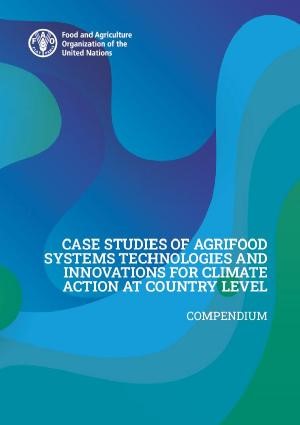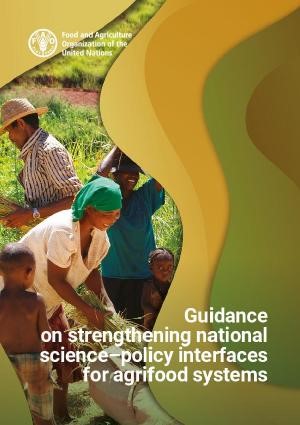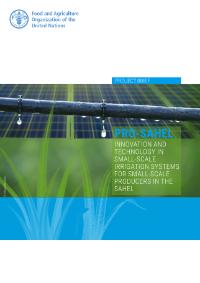Publications
Points essentiels

Stratégie de la FAO en matière de science et d’innovation
10/2022
La Stratégie vise à renforcer les travaux de la FAO en matière de science et d’innovation en fournissant des orientations et en apportant cohérence et harmonisation à l’échelle de l’Organisation dans le domaine de la science et de l’innovation. La science et l’innovation, qui constituent le fondement du Cadre stratégique 2022-2031 de la FAO, revêtent un caractère intersectoriel et présentent un intérêt pour l’ensemble du programme de travail de l’Organisation.
.jpg?sfvrsn=e3cb27e_10)
Plan d’action 2022-2025 pour la mise en oeuvre de la Stratégie de la FAO en matière de science et d’innovation
10/2023
Le Plan d’action relatif à la Stratégie de la FAO en matière de science et d’innovation (2022-2025) sert de cadre commun pour l’action de la FAO aux niveaux national, sous-régional, régional et mondial. La Stratégie de la FAO en matière de science et d’innovation (la Stratégie) est un outil qui vise à faciliter l’exécution du Cadre stratégique 2022-2031 de la FAO et, par conséquent, celle du Programme de développement durable à l’horizon 2030.

Investing in trade digitalization: the case of ePhyto
03/2025
Global trade in plants and plant products is rapidly expanding – more than doubling in some cases – and set to grow another 11 percent by 2032. Yet, many countries still employ mostly manual rather than electronic means for issuing the phytosanitary certificates required to trade goods internationally. Relying on paper slows applications for and delivery of these certificates.

Multistakeholder policy dialogue to promote innovation in agrifood systems
02/2025
Many agrifood development projects and programmes aim to support evidence-based and inclusive policies by organizing policy dialogues. Yet, despite their widely recognized importance, there is little guidance available to date on how to organize effective policy dialogues that are inclusive of diverse stakeholders. This training guide has been developed to address this gap by providing clear and comprehensive guidance on multistakeholder policy dialogue in agrifood systems.

Leveraging space technology for agricultural development and food security
02/2025
This report underscores the transformative potential of space technologies in enhancing agricultural productivity and ensuring food security amid global challenges.

Resilience and behaviour change assessment in Malawi in the districts of Mangochi, Ntcheu and Balaka
01/2025
This factsheet presents key findings from surveys conducted in Mangochi, Ntcheu, and Balaka between November and December 2023, using the Self-evaluation and Holistic Assessment of Climate Resilience of Farmers and Pastoralists (SHARP+) methodology—a tool developed by the Food and Agriculture Organization (FAO) to assess the resilience of smallholder farmers at the household level.

Curriculum for training of Multi-actors Agricultural Innovation Platform facilitators
01/2025
Multi-actors Agricultural Innovation Platform (MAIP) is established in rural communities where farmers and key value chain actors become empowered through participatory action research, knowledge co-creation and application, market linkages and so on.

Self-evaluation and Holistic Assessment of Climate Resilience of Farmers and Pastoralist (Sharp+)
01/2025
The SHARP+ In-Brief presents the mains uses and implementation of the tool

Agrifood Systems Technologies and Innovations Outlook: Concept Note
12/2024
The Agrifood Systems Technologies and Innovations Outlook (ATIO) initiative, launching in 2025, aims to enhance understanding of technology and innovation uptake and factors shaping the technology frontier in agrifood systems. It will be the most comprehensive global source of information on innovative solutions for Agrifood Systems Transformation.

Case studies of agrifood systems technologies and innovations for climate action at country level
12/2024
Climate change is having a devastating effect on many of the world’s agrifood systems and the communities that rely on them for their livelihoods. This compendium contains summaries of forty case studies, from a total of over two hundred submitted to FAO for the Science and Innovation Forum 2023, that describe innovative efforts that have been made to address some of the challenges arising from climate change.

SHARP+ resilience assessment in Somalia in the districts of Jowhar and Balcad
12/2024
The SHARP+ resilience assessment in Somalia factsheet presents key findings from surveys conducted in the districts of Jowhar and Balcad in September 2024, as part of the multi-actor programme Jowhar Off-stream Storage Programme (JOSP).

Agro-industry versus agroecology? Two macroeconomic scenarios for 2050 in Andhra Pradesh, India
12/2024
This book presents the first macroeconomic scenario of a full transition to agroecology in 2050. It is for Andhra Pradesh, a state in southern India with 53 million inhabitants and 9.3 million farmers in 2020.

Guide for strengthening functional capacities in agricultural innovation
12/2024
The purpose of this guide is to contribute to the development of functional capabilities among individuals and organizations that support innovation in Latin America. The guide uses the common framework for capacity development promoted by the Tropical Agriculture Platform (TAP) to identify and strengthen key functional capacities in organizations and individuals.

Climate technologies for agrifood systems transformation Placing food security, climate change and poverty reduction at the forefront
12/2024
The report highlights the needs for robust technology assessments to underpin climate technology identification for agrifood systems transformation that addresses all stages of agrifood value chains. This needs to be supported by capacity-building programmes, targeted financing and fed into the ongoing climate policy process.

SHARP+ resilience assessment in the United Republic of Tanzania in the districts of Kaliua, Mlele, Sikonge and Urambo
11/2024
The SHARP+ resilience assessment in Tanzania factsheet presents key findings from surveys conducted in the districts of Kaliua, Mlele, Sikonge, and Urambo in September 2024, as part of the Drylands Sustainable Landscapes Impact Program (DSL-IP).

The State of Food and Agriculture 2024: Value-driven transformation of agrifood systems
11/2024
Uncovering the true cost of food is the first step in making agrifood systems more inclusive, resilient and sustainable. As The State of Food and Agriculture 2023 revealed, agrifood systems activities generate significant benefits for society, but also have negative impacts on economic, social and environmental sustainability.

Mapping affordable and transferrable climate-smart technologies for smallholder farmers
11/2024
In response to the pressing need for innovative solutions to address food security challenges, a Tripartite Cooperation Agreement between FAO Regional Office for the Near East and North Africa region, the International Fund for Agricultural Development (IFAD), and the Islamic Development Bank (IsDB) initiated a comprehensive “Mapping exercise of affordable and transferrable food security-related technologies”.

Guidance on strengthening national science–policy interfaces for agrifood systems
11/2024
In line with its Science and Innovation Strategy, FAO has developed this guidance on strengthening science–policy interfaces (SPIs) for agrifood systems at the national level, helping to ensure that effective policy decisions are made based upon sufficient, relevant, and credible science and evidence.

Digital technologies for multidimensional youth engagement in agrifood systems transformation
10/2024
The Young Scientists Group (YSG) conducted a comprehensive literature review which highlights various relevant case studies, together with a survey capturing the perspectives and experiences of youth. The results show that, for agrifood systems transformation initiatives, digital technologies provide youth with benefits such as being able to conduct tasks more efficiently, reach wider audiences and form collaborations.

Shaping sustainable agrifood futures: pre-emerging and emerging technologies and innovations for impact - An extended global foresight report with regional and stakeholders' insights
10/2024
FAO’s Office of Innovation is working with CIRAD (International Cooperation Centre of Agricultural Research for Development) and other partners on an FAO Chief Scientist initiative on foresight on pre-emerging and emerging agrifood technologies and innovations, aligned with UN 2.0 and The Future of Food and Agriculture 2022

A casebook of good practices and inspiring stories from Europe and Central Asia
07/2024
Amidst the challenges confronting agriculture in Europe and Central Asia, this casebook unfolds the stories of 25 farmers and agripreneurs who have successfully embraced digital technologies. The accounts presented here reveal that, despite the effects of climate change, the consequences of the war in Ukraine and the enduring impact of COVID-19, opportunities for innovation and resilience can still be found.

Financing to end hunger, food insecurity and malnutrition in all its forms
07/2024
Six years from 2030, hunger and food insecurity trends are not yet moving in the right direction to end hunger and food insecurity (SDG Target 2.1) by 2030. The indicators of progress towards global nutrition targets similarly show that the world is not on track to eliminate all forms of malnutrition (SDG Target 2.2).



.jpg?sfvrsn=c940880_11)


